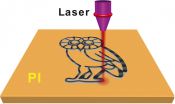Link between power lines and ill-health called into question
2014-12-10
(Press-News.org) Several past studies have suggested that the magnetic fields created by phones, high-voltage power lines and other electrical equipment are harmful for humans.
Research first carried out in the 1970's and again subsequently, found an association between people living near overhead power lines and an increased risk of childhood leukaemia. Although some later studies have failed to find such a link, the International Agency for Research on Cancer has categorised low frequency magnetic fields as "possibly carcinogenic."
But a mechanism for this association has never been found and now the team from the Manchester Institute of Biotechnology has ruled out one of the prime candidates, in a paper published today in the Journal of the Royal Society Interface. The team studied the effects of weak magnetic fields (WMFs) on key human proteins, including those crucial for health, and found that they have no detectable impact.
With funding from the Electromagnetic Fields Biological Research Trust, the team looked at how WMFs affected a protein class called flavoproteins, which are key to processes vital for healthy human function, such as the nervous system, DNA repair and the biological clock.
If these proteins go wrong then there are serious knock-on effects for human health. But after subjecting them to WMFs in the lab it became clear that they have no detectable impact.
Dr Alex Jones, research fellow at the School of Chemistry at The University of Manchester, and co-lead author of the paper, said: "There is still some concern among the public about this potential link, which has been found in some studies into cases of childhood leukaemia, but without any clear mechanism for why.
"Flavoproteins transfer electrons from one place to another. Along the path the electrons take, very short lived chemical species known as radical pairs are often created. Biochemical reactions involving radical pairs are considered the most plausible candidates for sensitivity to WMFs, but for them to be so the reaction conditions have to be right. This research suggests that the correct conditions for biochemical effects of WMFs are likely to be rare in human biology."
Professor Nigel Scrutton, co-lead author of the paper, from the Faculty of Life Sciences, said: "More work on other possible links will need to be done but this study definitely takes us nearer to the point where we can say that power-lines, mobile phones and other similar devices are likely to be safe for humans."
INFORMATION:
ELSE PRESS RELEASES FROM THIS DATE:
2014-12-10
While many different combinations of genetic traits can cause autism, brains affected by autism share a pattern of ramped-up immune responses, an analysis of data from autopsied human brains reveals. The study, a collaborative effort between Johns Hopkins and the University of Alabama at Birmingham, included data from 72 autism and control brains. It will be published online Dec. 10 in the journal Nature Communications.
"There are many different ways of getting autism, but we found that they all have the same downstream effect," says Dan Arking, Ph.D. , an associate professor ...
2014-12-10
HOUSTON - (Dec. 10, 2014) - Researchers at Rice University have created flexible, patterned sheets of multilayer graphene from a cheap polymer by burning it with a computer-controlled laser. The process works in air at room temperature and eliminates the need for hot furnaces and controlled environments, and it makes graphene that may be suitable for electronics or energy storage.
Under a microscope, what the researchers call laser-induced graphene (LIG) doesn't look like a perfect chicken wire-like grid of atoms. Instead, it's a jumble of interconnected graphene flakes ...
2014-12-10
Phoenix, AZ (December 10th, 2014) - The brain responds differently to two kinds of sugar, according to a report today at the American College of Neuropsychopharmacology annual meeting in Phoenix Arizona. The study suggests that fructose heightens the response of brain reward circuits to food cues, promoting feeding behavior.
Currently, roughly two out of three U.S. adults are overweight and one out of three is obese. Changes in lifestyle and dietary intake during the past quarter century are thought to be the main culprits, with the increase in fructose consumption of ...
2014-12-10
PISCATAWAY, NJ - Communities with fewer places to buy or drink alcohol also tend to have lower rates of intimate partner violence, new evidence suggests.
The research, published in the January issue of the Journal of Studies on Alcohol and Drugs, suggests that laws limiting what is called "alcohol outlet density" could offer one way to address violence within intimate relationships.
States and communities throughout the United States have enacted various laws to reduce excessive use of alcohol, including limiting outlet density, limiting hours and days of sale, and ...
2014-12-10
The simple act of saving something, such as a file on a computer, may improve our memory for the information we encounter next, according to new research published in Psychological Science, a journal of the Association for Psychological Science. The research suggests that the act of saving helps to free up cognitive resources that can be used to remember new information.
Our findings show that people are significantly better at learning and remembering new information when they save previous information," says psychological scientist and study author Benjamin Storm of ...
2014-12-10
PITTSBURGH, Dec. 9, 2014 - A treatment pioneered at the University of Pittsburgh Center for Vaccine Research (CVR) is far more effective than traditional antibiotics at inhibiting the growth of drug-resistant bacteria, including so-called "superbugs" resistant to almost all existing antibiotics, which plague hospitals and nursing homes.
The findings, announced online in the journal Antimicrobial Agents and Chemotherapy and funded by the National Institutes of Health, provide a needed boost to the field of antibiotic development, which has been limited in the last four ...
2014-12-10
Berkeley -- A systematic overview of more than 100 studies comparing organic and conventional farming finds that the crop yields of organic agriculture are higher than previously thought. The study, conducted by researchers at the University of California, Berkeley, also found that certain practices could further shrink the productivity gap between organic crops and conventional farming.
The study, to be published online Wednesday, Dec. 10, in the Proceedings of the Royal Society B, tackles the lingering perception that organic farming, while offering an environmentally ...
2014-12-10
In an editorial published online today in the International Journal of Epidemiology, experts from the Departments of Psychiatry and Epidemiology at Columbia University, New York, are calling for survivors of the Ebola epidemic to be mobilised in a bid to hasten containment of the disease.
We already know that the current Ebola outbreak is unique in its magnitude and for its dispersion in dense, mobile populations. Physicians and nurses face high mortality, and foreign aid in the form of medical supplies and staff continues to be unequal to the scope of the problem. With ...
2014-12-10
In a world first study researchers have found a coral-eating fish that disguises its smell to hide from predators.
"For many animals vision is less important than their sense of smell," says study lead author Dr Rohan Brooker from the ARC Centre of Excellence for Coral Reef Studies (Coral CoE) at James Cook University.
"Because predators often rely on odors to find their prey, even visually camouflaged animals may stick out like a sore thumb if they smell strongly of 'food'." Dr Brooker says.
The research, published in the journal Proceedings of the Royal Society B, ...
2014-12-10
In a report published today in the journal of Diabetes, Obesity and Metabolism, researchers from Cardiff University were also able to show a correlation between patients treated with a higher dosage of insulin and a raised risk of cancer development, heart attacks and stroke.
Researchers identified these trends by scrutinizing the medical history of 6,484 patients with type 2 diabetes extracted from the UK Clinical Practice Research Datalink (CPRD). Patients were on average aged 64 at the beginning of the study in 2000, and were followed for an average of 3 years from ...
LAST 30 PRESS RELEASES:
[Press-News.org] Link between power lines and ill-health called into question



